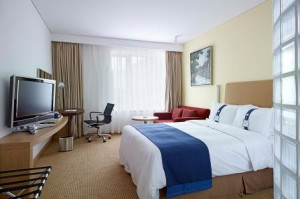Airbnb is an online community that connects short-term renters to people with space to rent. The company began in 2008 as “Air Bed and Breakfast” and was imagined after its founders rented out airbeds in their home. Six years since its humble beginning, Airbnb has shortened its name and inflated its offerings to include small rooms for international travelers, villas for high-end business travelers, and just about everything in between. The company makes it easy to find both simple spaces and those with all the comforts of home. Hosts can post pictures and descriptions of the spaces they have available; travelers can then reserve those spaces on Airbnb’s secure website.
Airbnb Offers an “Authentic Experience” for Travelers


There are many benefits to using a service like Airbnb, including the opportunity to meet people from around the world without having to pay for an expensive hotel room. Airbnb hosts also tend to provide more personalized services (e.g., welcome baskets and access to cooking- and crafting supplies) that outclass those offered by most hotels. Airbnb is becoming a popular resource for small towns around the world that hope to attract tourists but have limited lodging options. Building a new hotel can cost between $300,000 and many millions of dollars, so smaller towns simply can’t afford lodging for the tourists they hope to attract. Airbnb and other short-term rental companies offer a less-expensive alternative to hotels.
Short-Term Rentals Prompt Legislative Concerns for MA
Despite the benefits of the service, some legislators are expressing concerns about Airbnb. In Massachusetts, state representatives Aaron Michlewitz and RoseLee Vincent have tried to introduce legislation that would be among the strictest in the country for short-term rentals. The measures would legalize the rental process but impose strict safety and registration requirements, as well as a 5% tax on rentals (to match the tax for hotel rooms). The taxes collected would support the tourism industry. The bill would also allow cities and towns to run inspections of short-term rentals to enforce safety codes. San Francisco, Portland, and the state of New York have begun to introduce similar regulations on short-term rentals, though many have found these rules to be ineffective.
New Hospitality Regulations Increase Massachusetts Tax Revenue
In 2011, Massachusetts collected $562 million in hotel tax revenue; individual cities in the commonwealth collected an additional $358 million. In 2014, short-term rental sites in the city of Boston alone collected over $10 million in sales . . . and the industry shows no indication of slowing. In fact, as discovered by Rich Vetstein on The Massachusetts Real Estate Law Blog, “A recent Boston Globe article [found that] Airbnb’s website currently lists nearly 3,500 properties for rent in the Boston area—a 63% increase since July 2013.” That number continues to spike. Because traditional lodging such as hotels is so closely monitored, legislators feel that the short-term rental industry should see similar regulations.
Airbnb offers a valuable service to travelers, but it is critical that the service be safe and reliable for all who use it. By implementing laws that increase the safety of short-term rental units and require Airbnb to improve the state’s economy through tax revenue, Massachusetts is taking a step to regulate an industry that, to date, has seen little regulation in the United States.
What Do You Think?
Have you used Airbnb, or are you somehow involved in the hospitality industry? Do you think these regulations are necessary?






